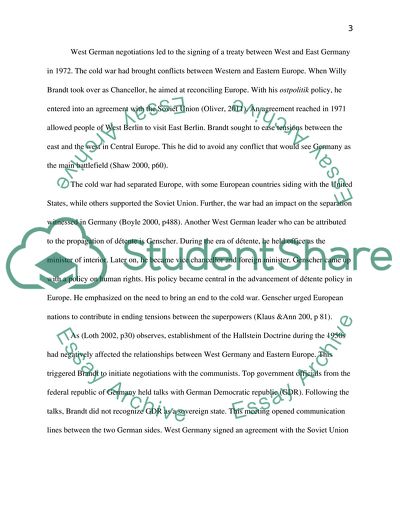Cite this document
(The Extent to Which the Two Germanys Contribute to the Dtente Policy in Europe during the 1970s Essay Example | Topics and Well Written Essays - 1500 words, n.d.)
The Extent to Which the Two Germanys Contribute to the Dtente Policy in Europe during the 1970s Essay Example | Topics and Well Written Essays - 1500 words. https://studentshare.org/history/1767201-love-to-what-extent-did-the-two-germanys-contribute-to-the-dtente-policy-in-europe-during-the-1970s
The Extent to Which the Two Germanys Contribute to the Dtente Policy in Europe during the 1970s Essay Example | Topics and Well Written Essays - 1500 words. https://studentshare.org/history/1767201-love-to-what-extent-did-the-two-germanys-contribute-to-the-dtente-policy-in-europe-during-the-1970s
(The Extent to Which the Two Germanys Contribute to the Dtente Policy in Europe During the 1970s Essay Example | Topics and Well Written Essays - 1500 Words)
The Extent to Which the Two Germanys Contribute to the Dtente Policy in Europe During the 1970s Essay Example | Topics and Well Written Essays - 1500 Words. https://studentshare.org/history/1767201-love-to-what-extent-did-the-two-germanys-contribute-to-the-dtente-policy-in-europe-during-the-1970s.
The Extent to Which the Two Germanys Contribute to the Dtente Policy in Europe During the 1970s Essay Example | Topics and Well Written Essays - 1500 Words. https://studentshare.org/history/1767201-love-to-what-extent-did-the-two-germanys-contribute-to-the-dtente-policy-in-europe-during-the-1970s.
“The Extent to Which the Two Germanys Contribute to the Dtente Policy in Europe During the 1970s Essay Example | Topics and Well Written Essays - 1500 Words”. https://studentshare.org/history/1767201-love-to-what-extent-did-the-two-germanys-contribute-to-the-dtente-policy-in-europe-during-the-1970s.


